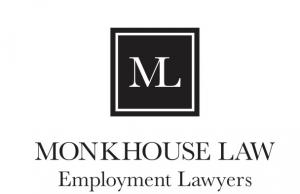
Court Affirms Protections for Whistleblower Employees: A Milestone Victory in Employment Rights
The case underscores the importance of protecting whistleblowers who report wrongdoing or harassment to appropriate authorities and employees who use private communication channels to discuss workplace conditions. Monkhouse Law, a firm known for its commitment to defending employee rights, successfully represented the two winning defendants, in this precedent-setting case.
The Case: Key Facts
The plaintiffs, CANADIAN TRUCK WARRANTY INC. (CTW) and its principal, Paul Donofrio, filed claims against several former employees.
In the Decision Justice Hood outlines the whistleblower complaints against CTW relating to the CRA and Ministry of Labour including complaints of sexual harassment which took place at the company of Mr. Donofrio, Canadian Truck Warranty Inc.
Canadian Truck Warranty Inc. sued the Defendants for claims included allegations of malicious prosecution, defamation, and economic torts. These claims were based on the defendants’ actions, such as:
• Anonymous whistleblower complaints: One defendant reported alleged misuse of government funds to the Canada Revenue Agency (CRA), and another defendant lodged a complaint with the Ministry of Labour regarding workplace sexual harassment.
• Private workplace discussions: The defendants participated in a WhatsApp group chat discussing workplace abuse and harassment.
• Other workplace grievances: Additional allegations included creating false records and making disparaging remarks about CTW.
The defendants moved to dismiss these claims under Ontario’s Anti-SLAPP provisions, arguing that their actions constituted expressions related to matters of public interest.
The Ruling
Justice Hood dismissed the claims against the whistleblower employees in their entirety under Section 137.1 of the Courts of Justice Act. The court found that the complaints to the CRA and Ministry of Labour, as well as discussions in the WhatsApp group, were expressions protected by law.
Key highlights of the ruling include:
1. Public Interest in Whistleblower Complaints: The court held that reports of alleged misuse of public funds and workplace sexual harassment are matters of public interest. These complaints, even when not leading to enforcement actions, remain protected forms of expression under the Anti-SLAPP framework.
2. Private Communications Protected: The court recognized the defendants’ WhatsApp group chat as a private forum to discuss workplace issues, deeming it a legitimate exercise of their rights to free expression, provided it was not used for malicious purposes.
3. Defamation Claims Rejected: The court found no evidence that statements made in the group chat or whistleblower complaints were defamatory or malicious.
4. Implications for Malicious Prosecution Claims: The court clarified that malicious prosecution claims require a proceeding to have been terminated in the plaintiff’s favor. Investigations by the CRA and Ministry of Labour, which did not progress to formal actions, did not meet this criterion.
Implications for Employee Rights
The ruling in CANADIAN TRUCK WARRANTY INC. establishes several critical precedents for employees:
1. Freedom to Report Misconduct: Employees can report concerns to regulatory bodies without fear of civil lawsuits, as such actions are protected under Anti-SLAPP laws. This ensures whistleblowers can address public interest issues, such as workplace harassment or financial misconduct, without intimidation.
2. Protected Private Discussions: Employees can use private communication platforms, like group chats, to discuss workplace grievances. These discussions are safeguarded unless evidence shows they were conducted with malice or intent to harm.
3. Legal Protections Against Retaliation: The decision reinforces that retaliatory lawsuits aimed at silencing employees will not only fail but may be summarily struck, saving defendants the burden of prolonged litigation.
Quotes from Andrew Monkhouse of Monkhouse Law
Monkhouse Law provides the following quotes and can be contacted at the below information for more comment on the case.
• “This case highlights that employers should be careful when suing to silent employees. Ontario has strong protections for employees who make legitimate complaints to dismiss frivolous lawsuits and award costs against companies who sue legitimate whistleblowers.” – Andrew Monkhouse
• “The CTW case expands the law to clearly include that employees are entitled to have ‘chat groups’ about their workplace complaints and it can be difficult for employers to sue employees for what they say in groups where they air legitimate complaints.” – Andrew Monkhouse
• “Employers going forward should reconsider suing their employees for making complaints to government authorities.”-Andrew Monkhouse
Monkhouse Law: Advocates for Employee Rights
Monkhouse Law played a pivotal role in securing this victory for employee rights. Representing the successful defendants the firm successfully argued that the plaintiffs’ claims were intended to silence public interest expressions and prevent scrutiny of workplace practices.
This case adds to Monkhouse Law’s successful record in defending whistleblowers and employees. The firm previously achieved success in Joshi v. Allstate Insurance Company of Canada, where the Superior Court of Ontario dismissed a lawsuit against a whistleblower employee under the Anti-SLAPP framework relating to alleged systemic discrimination in the insurance industry. In that case, the employee was sued for claiming workplace discrimination and harassment to a regulatory body.
The decision in CANADIAN TRUCK WARRANTY INC. is a victory for employee rights and a testament to the effectiveness of Ontario’s Anti-SLAPP provisions. It reinforces the principle that whistleblowers and employees must be able to express concerns about workplace misconduct without fear of retaliation.
Monkhouse Law remains at the forefront of advocating for employee rights in Canada. With a proven track record in Anti-SLAPP litigation and employment law, the firm continues to champion the interests of employees facing unjust treatment.
Monkhouse Law Employment Lawyers
Website: https://www.monkhouselaw.com
Address: 220 Bay St. Suite 900, Toronto, Ontario, Canada, M5J 2W4
Ph: 416-907-9249
Email: reception@monkhouselaw.com
Andrew Monkhouse
Monkhouse Law Employment Lawyers
+1 416-907-9249
email us here
Distribution channels: Human Rights, Law, Social Media
Legal Disclaimer:
EIN Presswire provides this news content "as is" without warranty of any kind. We do not accept any responsibility or liability for the accuracy, content, images, videos, licenses, completeness, legality, or reliability of the information contained in this article. If you have any complaints or copyright issues related to this article, kindly contact the author above.
Submit your press release
